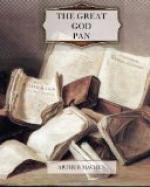These three, however, were “good lives,”
but yet not proof against the Zulu assegais and typhoid
fever, and so one morning Aubernon woke up and found
himself Lord Argentine, a man of thirty who had faced
the difficulties of existence, and had conquered.
The situation amused him immensely, and he resolved
that riches should be as pleasant to him as poverty
had always been. Argentine, after some little
consideration, came to the conclusion that dining,
regarded as a fine art, was perhaps the most amusing
pursuit open to fallen humanity, and thus his dinners
became famous in London, and an invitation to his
table a thing covetously desired. After ten
years of lordship and dinners Argentine still declined
to be jaded, still persisted in enjoying life, and
by a kind of infection had become recognized as the
cause of joy in others, in short, as the best of company.
His sudden and tragical death therefore caused a
wide and deep sensation. People could scarcely
believe it, even though the newspaper was before their
eyes, and the cry of “Mysterious Death of a
Nobleman” came ringing up from the street.
But there stood the brief paragraph: “Lord
Argentine was found dead this morning by his valet
under distressing circumstances. It is stated
that there can be no doubt that his lordship committed
suicide, though no motive can be assigned for the
act. The deceased nobleman was widely known
in society, and much liked for his genial manner and
sumptuous hospitality. He is succeeded by,”
etc.,
etc.
By slow degrees the details came to light, but the
case still remained a mystery. The chief witness
at the inquest was the deceased’s valet, who
said that the night before his death Lord Argentine
had dined with a lady of good position, whose named
was suppressed in the newspaper reports. At about
eleven o’clock Lord Argentine had returned,
and informed his man that he should not require his
services till the next morning. A little later
the valet had occasion to cross the hall and was somewhat
astonished to see his master quietly letting himself
out at the front door. He had taken off his evening
clothes, and was dressed in a Norfolk coat and knickerbockers,
and wore a low brown hat. The valet had no reason
to suppose that Lord Argentine had seen him, and though
his master rarely kept late hours, thought little
of the occurrence till the next morning, when he knocked
at the bedroom door at a quarter to nine as usual.
He received no answer, and, after knocking two or
three times, entered the room, and saw Lord Argentine’s
body leaning forward at an angle from the bottom of
the bed. He found that his master had tied a
cord securely to one of the short bed-posts, and,
after making a running noose and slipping it round
his neck, the unfortunate man must have resolutely
fallen forward, to die by slow strangulation.
He was dressed in the light suit in which the valet
had seen him go out, and the doctor who was summoned




